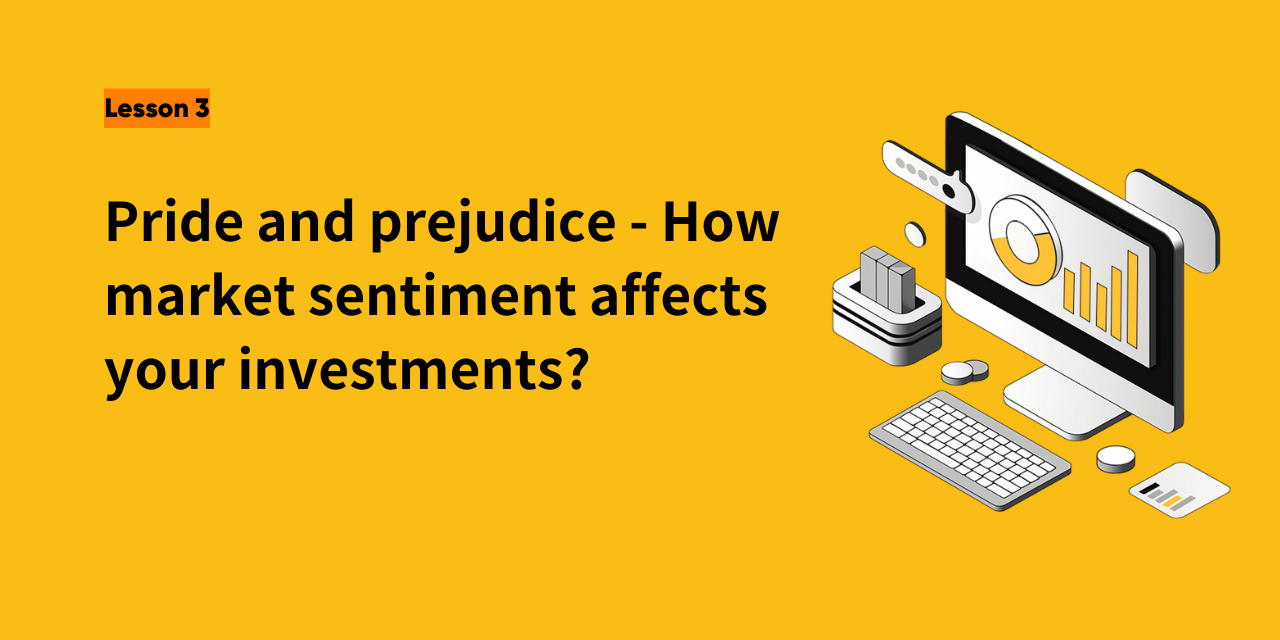Hello Tigers!
In the second lesson, I took you through cognitive biases, helping you understand why we often make repeated mistakes in investing. In this lesson, we're going to delve into another crucial aspect affecting your investment gains and losses: market sentiment.
1.Why Market Sentiment Influences Investment Decisions
Traditional finance theory holds that stock prices always reflect the underlying value of listed companies. But is this really the case?
Investors who have put their money into stocks should be aware that in actual financial markets, stock prices frequently diverge significantly from the true value of the listed companies. This phenomenon is primarily driven by investor sentiment.
Emotions are a dominant force affecting various aspects of our lives. Our decisions, conclusions drawn from experiences, and even our personalities are primarily influenced by emotions.
In many respects, what we perceive as reality is not determined by facts but by feelings. Psychologists believe that emotions drive 80% of our choices, while facts and objectivity represent only 20% of our decision-making.
There's an old saying on Wall Street: "Financial markets are driven by two powerful emotions - greed and fear."
Investment legend Warren Buffett once wrote to shareholders: "Fear and greed, these two highly contagious diseases, occasionally erupt but will always exist in the investment market."
In the investment market, market sentiment swings like a pendulum, often oscillating from irrational exuberance to baseless pessimism, forming cycles. These emotional cycles often lead investors to make wrong decisions at the wrong times.
For example, fluctuations in market sentiment often trigger phenomena of overbuying and overselling.
When market sentiment is pessimistic, investors may oversell, leading to undervalued stock prices.
Conversely, when market sentiment is optimistic, investors may overbuy, leading to overvalued stock prices. This emotion-driven behavior deviates from rational investment, causing market prices to deviate from their true value.
2.Three Types of Market Sentiment Affecting Investment Decisions
In investment, there are three types of market sentiment that often affect our investment decisions:
"Pride" sentiment in investment - Overconfidence
Confidence is the acknowledgment of one's abilities.
Traditional finance theory holds that rational individuals have an accurate perception of their abilities. Irrational individuals perceive their abilities to be higher than their actual level, which is overconfidence.
In reality, most investors in the market are overconfident, leading to biased investment decisions.
In financial markets, overconfidence leads people to overlook risks and make excessive trades.
In other words, when they shouldn't buy, many keep buying continuously; when they shouldn't sell, many keep selling continuously. Many investors make numerous trades but find they haven't made much money.
The more they trade, the more they lose, and this is the reason.
"Prejudice" sentiment in investment - Emotional bias
In 2018, a survey by a large brokerage firm found that when the S&P 500 index fell by 4.38%, the losses of ordinary investors were often more than double this figure.
The reason is that during market downturns, many investors make judgments based on emotions, resulting in more losses.
Another study in the same year showed that emotional biases lead to impulsive or irrational choices, thus negatively affecting returns.
Two typical emotional biases are greed and fear.
Greed is the desire for material wealth or gains, usually associated with taking excessive risks. In investment, greed drives individuals to chase high-risk investments.
Many investors are attracted by returns without fully understanding asset risks and enter the market hastily, only to end up with unsatisfactory results.
The consequence of taking on risks beyond one's capacity for the sake of maximizing returns may lead to significant losses.
For example, investing in speculative stocks or frequently timing the market, hoping to gain high returns in a short time, often entails immense risks.
Fear of market fluctuations or facing suddenly occurring "black swan" events might prompt you to make hasty decisions without fully considering all available information.
This is often referred to as a "risk-averse" mentality, selling during market downturns to avoid further losses, even if it means missing out on future potential gains. From the perspective of long-term investment results, this behavior is likely to reduce your investment returns.
"Overreaction" sentiment in investment - Attention Deficit
The term "attention bias" is frequently mentioned, highlighting the human brain's inclination to conflate the seriousness of an event with its probability of occurrence.
For example, when the media frequently reports on plane crashes during a certain period, it triggers public fear of flying. However, the actual probability of a plane crash is much smaller than that of other modes of transportation like cars.
Meanwhile, more real and subtle risks, such as heart disease or diabetes, are easier for people to downplay and thus ignore their threats.
In the financial field, due to the development of the media, you can always quickly obtain countless pieces of information about the market from various sources. However, these pieces of information often contain a mixture of truth and falsehood.
Making decisions based on short-term information or being influenced by personal opinions due to anchoring bias may lead to erroneous investment decisions.
Good investors try to avoid reacting to short-term events and instead of seizing market opportunities by predicting (or responding to) short-term events.
Alternatively, you can lengthen your time frame, using time to "smooth out" the fluctuations generated by short-term events, thereby minimizing the likelihood of making erroneous investment decisions due to attention deficit.
As Buffett said: "In investing, it's not necessary to do extraordinary things to achieve extraordinary results." Achieving good results doesn't require extraordinary insights or complex strategies but rather maintaining a calm mind during brief periods of turbulence.
With this, we come to the end of this lesson. I believe that understanding the impact of market sentiment on investment decisions will help you maintain a clear mind during trading.
See you in the next lesson!

